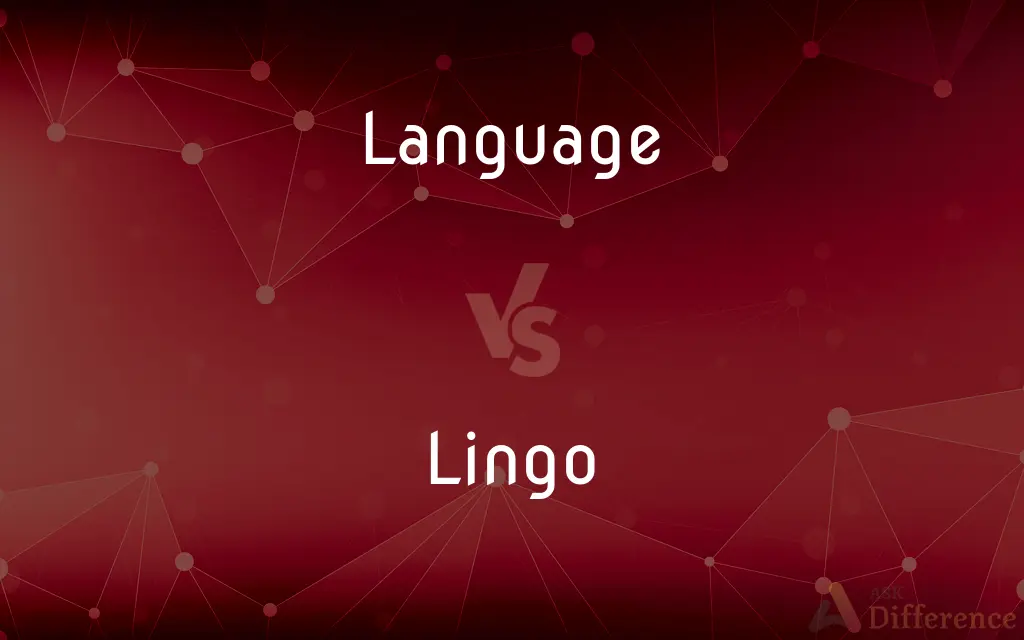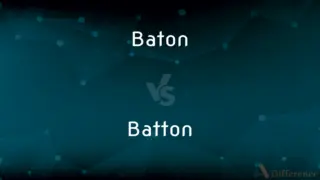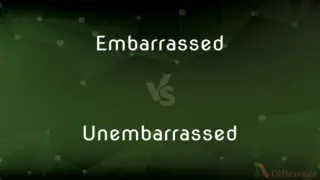Language vs. Lingo — What's the Difference?

Difference Between Language and Lingo
ADVERTISEMENT
Compare with Definitions
Language
A language is a structured system of communication used by humans, based on speech and gesture (spoken language), sign, or often writing. The structure of language is its grammar and the free components are its vocabulary.
Lingo
The specialized vocabulary of a particular field or social group, especially when viewed as unfamiliar
Computer lingo.
The lingo of the local residents of the island.
"the lingo that rough union guys used among themselves" (Philip Roth).
Language
Communication of thoughts and feelings through a system of arbitrary signals, such as voice sounds, gestures, or written symbols.
Lingo
Language, especially language peculiar to a particular group, field, or region; jargon or a dialect.
Language
Such a system including its rules for combining its components, such as words.
ADVERTISEMENT
Lingo
Language; speech; dialect.
Language
Such a system as used by a nation, people, or other distinct community; often contrasted with dialect.
Lingo
A characteristic language of a particular group (as among thieves);
They don't speak our lingo
Language
A system of signs, symbols, gestures, or rules used in communicating
The language of algebra.
Language
(Computers) A system of symbols and rules used for communication with or between computers.
Language
Body language; kinesics.
Language
The special vocabulary and usages of a scientific, professional, or other group
"his total mastery of screen language—camera placement, editing—and his handling of actors" (Jack Kroll).
Language
A characteristic style of speech or writing
Shakespearean language.
Language
A particular manner of expression
Profane language.
Persuasive language.
Language
The manner or means of communication between living creatures other than humans
The language of dolphins.
Language
Verbal communication as a subject of study.
Language
The wording of a legal document or statute as distinct from the spirit.
Language
(countable) A body of words, and set of methods of combining them (called a grammar), understood by a community and used as a form of communication.
The English language and the German language are related.
Deaf and mute people communicate using languages like ASL.
Language
(uncountable) The ability to communicate using words.
The gift of language
Language
(uncountable) A sublanguage: the slang of a particular community or jargon of a particular specialist field.
Legal language;
The language of chemistry
Language
The expression of thought (the communication of meaning) in a specified way; that which communicates something, as language does.
Body language;
The language of the eyes
Language
A body of sounds, signs and/or signals by which animals communicate, and by which plants are sometimes also thought to communicate.
Language
A computer language; a machine language.
Language
(uncountable) Manner of expression.
Language
(uncountable) The particular words used in a speech or a passage of text.
The language used in the law does not permit any other interpretation.
The language he used to talk to me was obscene.
Language
(uncountable) Profanity.
Language
A languet, a flat plate in or below the flue pipe of an organ.
Language
To communicate by language; to express in language.
Language
An admonishment said in response to vulgar language.
Language
Any means of conveying or communicating ideas;
Language
The expression of ideas by writing, or any other instrumentality.
Language
The forms of speech, or the methods of expressing ideas, peculiar to a particular nation.
Language
The characteristic mode of arranging words, peculiar to an individual speaker or writer; manner of expression; style.
Others for language all their care express.
Language
The inarticulate sounds by which animals inferior to man express their feelings or their wants.
Language
The suggestion, by objects, actions, or conditions, of ideas associated therewith; as, the language of flowers.
There was . . . language in their very gesture.
Language
The vocabulary and phraseology belonging to an art or department of knowledge; as, medical language; the language of chemistry or theology.
Language
A race, as distinguished by its speech.
All the people, the nations, and the languages, fell down and worshiped the golden image.
Language
Any system of symbols created for the purpose of communicating ideas, emotions, commands, etc., between sentient agents.
Language
Any set of symbols and the rules for combining them which are used to specify to a computer the actions that it is to take; also referred to as a computer lanugage or programming language; as, JAVA is a new and flexible high-level language which has achieved popularity very rapidly.
Language
To communicate by language; to express in language.
Others were languaged in such doubtful expressions that they have a double sense.
Language
A systematic means of communicating by the use of sounds or conventional symbols;
He taught foreign languages
The language introduced is standard throughout the text
The speed with which a program can be executed depends on the language in which it is written
Language
(language) communication by word of mouth;
His speech was garbled
He uttered harsh language
He recorded the spoken language of the streets
Language
A system of words used in a particular discipline;
Legal terminology
The language of sociology
Language
The cognitive processes involved in producing and understanding linguistic communication;
He didn't have the language to express his feelings
Language
The mental faculty or power of vocal communication;
Language sets homo sapiens apart from all other animals
Language
The text of a popular song or musical-comedy number;
His compositions always started with the lyrics
He wrote both words and music
The song uses colloquial language
Share Your Discovery

Previous Comparison
Baton vs. Batton
Next Comparison
Embarrassed vs. Unembarrassed














































